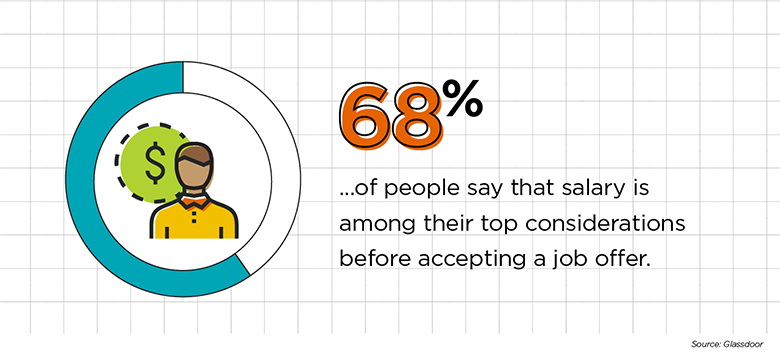The debate about including a salary range in a job post has been simmering in the world of recruiting for several years now, yet experts are still at odds about whether it’s a good or bad idea.
Many, like Forbes contributor Liz Ryan, emphatically believe in including salary information in job posts – and that failing to do so is not only a big waste of time, but also a point of dishonor.
“The sensible and ethical thing to do is to include a salary range in every job ad,” Ryan wrote in a 2015 blog post. “That way, people who don’t want the job at the salary you’re willing to pay won’t waste their time and your time applying for the position.”
Ryan’s opinion might be more absolute than most, but there are countless other HR leaders who have the same take for slightly different reasons.
“We don’t include salary in any of our job posts or job descriptions,” said Dana Goldberg Cutter, HR Manager at Extreme Reach, a digital media and software-as-a-service company based in Needham, Massachusetts. “The reasoning is that we don’t want to limit our candidate pool. If we include the salary information, we feel we may be eliminating a segment of the population.”
Cutter, whose organization has offices across the country, says the company’s unwritten policy also exists to prevent problems between their branch offices.
“With a Chicago hire versus an LA hire versus a New York hire, the salaries for a similar role may be completely different,” she said. “So we also don’t want to create competition between our offices by potentially revealing what a role might pay in one city over another city.”
But how far should a recruiter or hiring manager take the screening process before revealing the salary – and finding out if what is budgeted for the role aligns with the candidate’s expectations? As an experienced recruiter, Cutter said she is usually able to anticipate a candidate’s general salary requirements by looking at their professional background and education, as well as their location.
“I try to do my due diligence in the beginning of the process and look at all the little details on a candidate’s resume and at the market ranges for where the position is located,” she said. “Very rarely do I find myself talking to a candidate who is totally off the mark.”
Glassdoor’s Community Expert Scott Dobroski disagrees with this tactic. Glassdoor, a leading jobs and recruiting site, is on a mission to make the addition of salary range the norm rather than the exception in job postings.
According to the company’s research, 68% of people say that compensation is among their top considerations before accepting a job offer. Yet, Dobroski estimates that, across all jobs boards, only 10-15% of job listings actually include salary information.

“In terms of adding salary in job postings, in social media posts, in your career center, etc., we at Glassdoor believe that greater transparency regarding salary produces higher quality candidates.”
Dobroski understands that many companies believe holding out on sharing salary details offers them greater flexibility; however, he also believes this idea is being perpetuated by hiring managers and companies who don’t understand the benefits associated with being direct about compensation.
He includes in his definition of transparency company reviews, compensation being clearly stated in job posts, and information about how companies judge employees for performance-based raises and promotions.
“If you knew all of this before you even got in the door, oh my gosh, think about how much time that would save jobseekers,” Dobroski said. “For recruiters and companies, it would save not just time but money and, in the world of business, time is money.”
 MightyRecruiter
MightyRecruiter




Leave a Reply